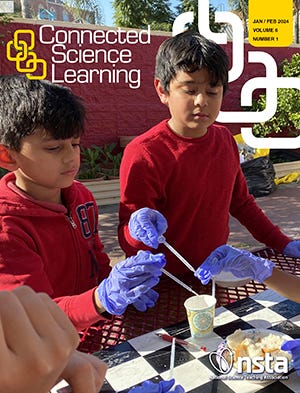A Brief Review of Informal STEM Education Evaluator Competency Frameworks
Welcome to Insights & Opportunities: A Hub for Informal STEM Education! Insights & Opportunities is a twice-monthly newsletter for educators, administrators, legislators, and advocates who recognize the importance of informal STEM learning.
This newsletter is brought to you by me, Sarah Dunifon, and my team at Improved Insights. I’m a long-time STEM educator, researcher, and equity advocate. Along with my team, I now work on cutting-edge informal STEM learning research and evaluation.
Each edition of this newsletter offers exciting insights, resources, and opportunities for informal STEM learning professionals, including funding, jobs, professional development, informal STEM learning research, evaluation tips and resources, and so much more! We hope you find it valuable. Now, let’s get started.
A Brief Review of Informal STEM Education Evaluator Competency Frameworks
With so many different practitioners in the evaluation field from many academic disciplines and backgrounds, it can be challenging to establish a common set of criteria to assess a broad scope of evaluation practices.
In informal STEM education evaluation, resources have been developed that aid evaluators in assessing their practices and considering areas for potential development. Let’s explore a few of them.
The American Evaluation Association (AEA), a premier U.S.-based professional organization for evaluators, developed a set of principles to which they encourage evaluators to adhere. First adopted in 1994, these principles are intended to serve as an ethics guide for evaluators. The AEA engages with its members to review and update these principles every five years to ensure they reflect the realities of an ever-changing world. Last updated in 2018, these principles are:
Systematic Inquiry: Evaluators conduct data-based inquiries that are thorough, methodical, and contextually relevant.
Competence: Evaluators provide skilled professional services to stakeholders.
Integrity: Evaluators behave with honesty and transparency in order to ensure the integrity of the evaluation.
Respect for People: Evaluators honor the dignity, well-being, and self-worth of individuals and acknowledge the influence of culture within and across groups.
Common Good and Equity: Evaluators strive to contribute to the common good and advancement of an equitable and just society.
These principles provide a sturdy foundation for evaluators to base their practice on, regardless of their focus.
To read the full article, check it out in our Insights.
Our Updates
We're excited to celebrate the first edition of Evaluation Insights, our column in Connected Science Learning. I was invited to serve as the evaluation expert contributing to this National Science Teaching Association journal focused on the intersections between formal and informal learning. The column offers an introduction to program evaluation for both formal and informal STEM learning environments, highlighting key terms and ideas useful for practitioners. The column will appear quarterly in Connected Science Learning. Check out the first edition, and stay tuned for more!
60-Second Suggestions
Here are a few of my favorite things this month, usually pertaining to informal STEM education and evaluation, but occasionally some fun personal stuff, too.
This article from the Washington Post explores a new AI innovation that has been implemented at the National WWII Museum in New Orleans to create an interactive exhibit. The ultimate goal of the exhibit was to capture an array of voices from WWII survivors and preserve their memories. By knitting together the interviews with an AI that searches for relevant clips from a database of answers, visitors can “converse” with life-size, video images of the interviewees, creating an intimate, interactive experience.
The Afterschool Alliance, as part of their larger Election Toolkit (a collection of talking points, sample materials, and information on how your non-profit organization can participate in the electoral process), has developed a guide to advocating for afterschool STEM. This guide highlights several data-backed talking points for why afterschool STEM learning matters for students and their communities, and provides two real-world examples of programs in action that demonstrate the impact of afterschool learning.
Check out this clip from NPR’s Weekend Edition about NASA’s hunt for the next generation of astronauts. This brief discussion with April Jordan, manager of NASA astronaut selection, sheds light on NASA’s priorities and what they are looking for in a strong astronaut candidate. This could make a great addition to a program focused on STEM careers, social-emotional learning applications, and space science!
Opportunities
Check out these new opportunities for the informal STEM learning community.
Funding:
2024 HHF Program Grant, Hulsebosch Hope Foundation (HHF), $7,500-$20,000. Certified public charities in the city of Chicago are invited to apply for program funding that supports quality education and the care and support of children, among other core areas. Programs should serve under-resourced communities, particularly on the south and west sides of the city. Applications are due May 15, 2024.
California Wildlands Grassroots Fund, Rose Foundation for Communities and the Environment, $4,000-$10,000. California-based nonprofits are invited to apply for funding that supports the preservation of California's wilderness and biological diversity. Strategies for preservation supported by the grant include public education efforts, scientific research (including citizen science), and media campaigns, among others. Applications are due May 15, 2024.
Community Project Funding, FY25 Congressional Funding Opportunity, $50,000-$11 million. Community Project Funding allows members of Congress to incorporate projects from their districts and states directly into the federal budget. Each member will designate a handful of local, mostly capital projects that are vetted and selected by their offices. Eligible groups include nonprofits, tribal authorities, governmental entities, regional administrations, and more. Funding amounts range anywhere from $50,000-$11 million, and funding deadlines vary by office.
STEM Stars Grant Program, Glenn W. Bailey Foundation, up to $50,000. Funding is available to organizations that support middle and high school students in advanced STEM programs (both in and out of school) who ultimately want to pursue a college degree in a STEM-related field. Various STEM interest areas are supported by the grants, including Enrichment Activities, Assessment and Evaluation, and Parent and Community Engagement. Applications are considered on a rolling basis.
Student STEM Enrichment Program, Burroughs Wellcome Fund, up to $60,000. Grants will be awarded in support of career-oriented and practical programs that provide creative science enrichment activities for students in K-12 education. Eligible applicants include colleges and universities, community groups, museums and zoos, public and private schools, and scientific organizations. Applications are due June 11, 2024.
Jobs and Fellowships:
Chief Program and Growth Officer, STEM from Dance (New York, NY), $110,000. The Chief Program & Growth Officer (CPGO) will lead programs and expansion efforts nationally and internationally. They will spearhead program development, implementation, and evaluation, and cultivate partnerships to propel growth across local, regional, and national levels.
Director of Learning, aiEDU (Remote), $145,000. The Director of Learning will oversee and grow the AI Literacy team in alignment with the organization's goals. They will collaborate closely with the Professional Learning staff and Programs Team to develop and deliver teacher professional development experiences that align with the content and quality of the aiEDU curriculum.
Environmental Education Fellowship, Saint John’s University (Collegeville, MN), $17.50/hour. The 12-month fellowship provides an opportunity for recent college graduates interested in environmental education to gain hands-on experience with program development and implementation for preK-12 students, college students, and the general public. Applications are due April 22, 2024.
Senior Programs Lead, aiEDU (California/West Coast), $125,000. The Senior Programs Lead will implement and manage programs in collaboration with school districts, focusing on building robust relationships with school districts on the west coast to ensure the effective delivery of AI literacy education. The Lead will coordinate with internal teams and leadership to tailor resources and strategies to meet the specific requirements of each district. California-based applicants will be given precedence, but those from neighboring states are invited to apply.
Specialist for STEM Competitions, Society for Science (Washington, D.C.), $60,000. The Specialist for STEM Competitions will support the execution and promotion of the Society’s three core competitions: the Regeneron International Science & Engineering Fair (ISEF), the Regeneron Science Talent Search (STS), and the Thermo Fisher Scientific Junior Innovators Challenge (JIC).
Professional Development:
Call for Proposals, 2024 Association of Nature Center Administrators (ANCA) Summit, September 9-13, 2024 (Memphis, TN). The 2024 ANCA Annual Summit is now accepting program proposals. Program types include workshops and facilitated discussions, with possible topics ranging from community outreach to starting a nature center. Proposals are due May 27, 2024.
Environmental Education & Civic Engagement, North American Association for Environmental Education (Virtual). Join ee360+, an initiative of the North American Association for Environmental Education, for Environmental Education & Civic Engagement, an expert panel that will explore the influence of environmental education on civic engagement. The panel will focus on strategies for integrating civic engagement principles in nonformal environmental programs and school curricula. The webinar will take place May 1, 2024, at 10:00 AM EDT.
Including All Learners in Engineering, Click2Engineering (Virtual). Join Click2Engineering's virtual workshop to develop strategies for creating engaging engineering experiences for all youth. Experience hands-on engineering and come away with ideas you can put into practice. The webinar will take place April 24, 2024, at 12:00 PM EDT.
Introducing the New InformalScience.org!, REVISE Center (Virtual). The REVISE Center is hosting a webinar to launch the new InformalScience.org. Join them on May 22, 2024, at 2:20 PM EDT to learn more about the redesign and experience a virtual tour of the website and its repository of tools for informal educators.
IRB Basics: An Introduction to IRBs in Informal STEM Education, REVISE Center (Virtual). The REVISE Center will host an informational webinar on Institutional Review Boards (IRB) and their role in Informal STEM education work. "Whether you are new to research or seeking a comprehensive IRB refresher, [this webinar] is designed to enhance your understanding of ethical human subject research in ISE initiatives." The webinar will take place on April 29, 2024, at 2:00 PM EDT.
Project Brainy, The Institute for the Study of Resilience in Youth (ISRY). The Institute for the Study of Resilience in Youth (ISRY) is seeking out-of-school time leaders to implement Project Brainy, a curriculum for middle school youth (grades 6 through 8) that focuses on social-emotional development, science learning, and literacy skills while supporting youth mental health. Those who are interested in implementing the curriculum should apply by May 17, 2024. Selected facilitators will receive a $1,500 stipend upon project completion.
Thanks for tuning in to this edition of Insights and Opportunities. While you’re waiting for the next edition, tell your friends! We appreciate you sending along a blog post you enjoyed, a job opportunity you think a friend should apply for, and resources you found valuable. Sharing this newsletter is the best way to support this work. Until next time - thanks!










